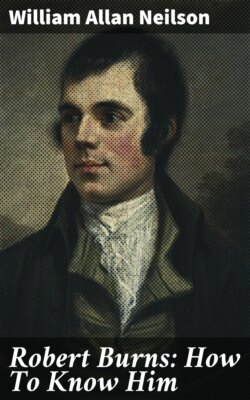Читать книгу Robert Burns: How To Know Him - William Allan Neilson - Страница 4
На сайте Литреса книга снята с продажи.
ОглавлениеI've noticed, on our Laird's court-day—
And mony a time my heart's been wae—
Poor tenant bodies, scant o' cash,
How they maun thole a factor's snash;
He'll stamp and threaten, curse and swear,
He'll apprehend them, poind their gear;
While they maun stan', wi' aspect humble,
And hear it a', and fear and tremble!
In 1777 Mount Oliphant was exchanged for the farm of Lochlea, about ten miles away, and here William Burnes labored for the rest of his life. The farm was poor, and with all he could do it was hard to keep his head above water. His health was failing, he was harassed with debts, and in 1784 in the midst of a lawsuit about his lease, he died.
In spite of his struggle for a bare subsistence, the elder Burnes had not neglected the education of his children. Before he was six, Robert was sent to a small school at Alloway Mill, and soon after his father joined with a few neighbors to engage a young man named John Murdoch to teach their children in a room in the village. This arrangement continued for two years and a half, when, Murdoch having been called elsewhere, the father undertook the task of education himself. The regular instruction was confined chiefly to the long winter evenings, but quite as important as this was the intercourse between father and sons as they went about their work.
“My father,” says the poet's brother Gilbert, “was for some time almost the only companion we had. He conversed familiarly on all subjects with us, as if we had been men; and was at great pains, as we accompanied him in the labours of the farm, to lead the conversation to such subjects as might tend to increase our knowledge, or confirm our virtuous habits. He borrowed Salmon's Geographical Grammar for us, and endeavoured to make us acquainted with the situation and history of the different countries in the world; while, from a book-society in Ayr, he procured for us Derham's Physics and Astro-Theology, and Ray's Wisdom of God in the Creation, to give us some idea of astronomy and natural history. Robert read all these books with an avidity and industry scarcely to be equalled. My father had been a subscriber to Stackhouse's History of the Bible … ; from this Robert collected a competent knowledge of ancient history; for no book was so voluminous as to slacken his industry, or so antiquated as to dampen his researches. A brother of my mother, who had lived with us some time, and had learned some arithmetic by our winter evening's candle, went into a book-seller's shop in Ayr to purchase the Ready Reckoner, or Tradesman's Sure Guide, and a book to teach him to write letters. Luckily, in place of the Complete Letter-Writer, he got by mistake a small collection of letters by the most eminent writers, with a few sensible directions for attaining an easy epistolary style. This book was to Robert of the greatest consequence. It inspired him with a strong desire to excel in letter-writing, while it furnished him with models by some of the first writers in our language.”
Interesting as are the details as to the antiquated manuals from which Burns gathered his general information, it is more important to note the more personal implications in this account. Respect for learning has long been wide-spread among the peasantry of Scotland, but it is evident that William Burnes was intellectually far above the average of his class. The schoolmaster Murdoch has left a portrait of him in which he not only extols his virtues as a man but emphasizes his zest for things of the mind, and states that “he spoke the English language with more propriety—both with respect to diction and pronunciation—than any man I ever knew, with no greater advantages.” Though tender and affectionate, he seems to have inspired both wife and children with a reverence amounting to awe, and he struck strangers as reserved and austere. He recognized in Robert traces of extraordinary gifts, but he did not hide from him the fact that his son's temperament gave him anxiety for his future. Mrs. Burnes was a devoted wife and mother, by no means her husband's intellectual equal, but vivacious and quick-tempered, with a memory stored with the song and legend of the country-side. Other details can be filled in from the poet's own picture of his father's household as given with little or no idealization in The Cotter's Saturday Night.
